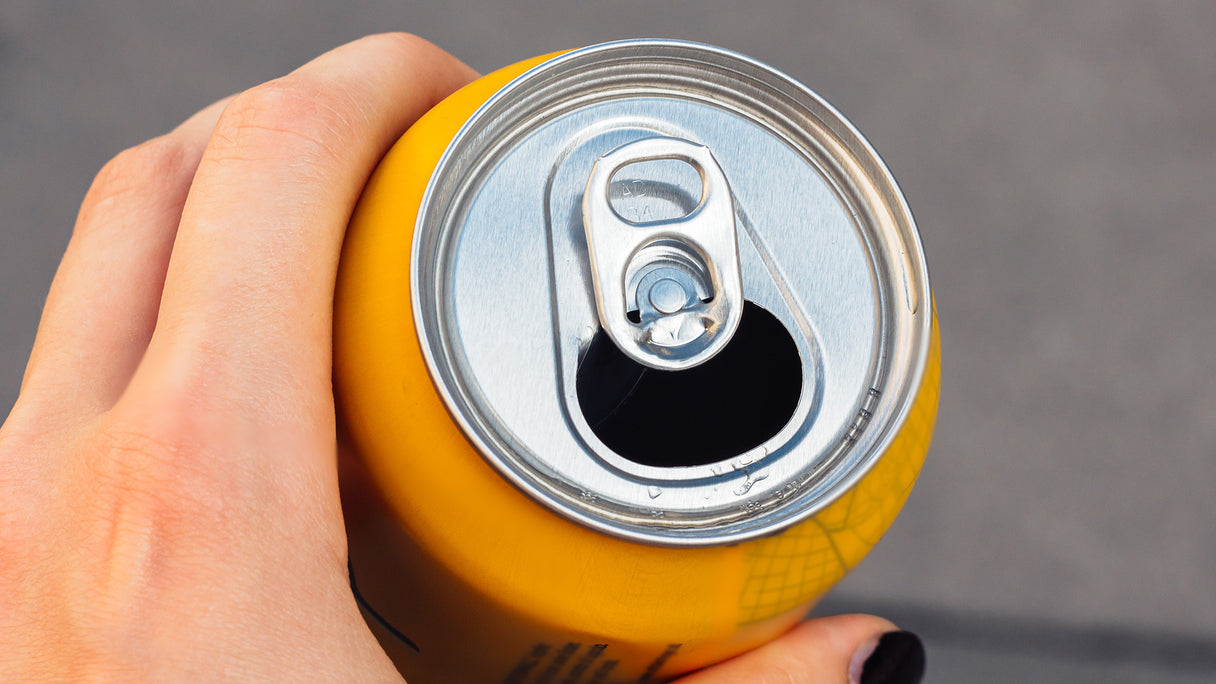What are PFAs (forever chemicals)?

When you think of the word 'forever', you likely have positive connotations to it, but in the world of toxic chemicals, it's far from positive. Our team of nutritionists, weighs in on PFAs, a huge group of chemicals that we know little about, and discusses where they can be found, how concerning they are to our health and how to limit exposure to them.
What are PFAs?
Forever chemicals, also known as PFAs (per- and polyfluoroalkyl substances), are a group of toxic, synthetic man-made chemicals that are widespread and can be found in a staggering amount of everyday industrial and consumer products, including food and drinks, as well as in the air, soil, water and even dust. They are harmful to human health as they are incredibly persistent and stable, so they don't break down easily, and they are resistant to grease, water and heat. Once they get into our environment, there is virtually no way we can get rid of them. Hence the name ‘forever chemicals’, as they can be present decades later, even if a country bans them.
There are thousands of substances that fall within the toxic synthetic chemicals class and almost all the PFAS ever made is still out there in our environment today. Nutritional therapist and pharmacist of 10 years, Isabelle Nunn says, "This is truly alarming, as there are such a wide array of these PFAs in so many consumer and industrial products! It makes it indeed very challenging for the authorities to further study and assess the potential and risks of chemical exposure on our health and on its impact on the environment."

Expert nutritionist Naomi Rowling notes that in response to mounting evidence of the harmful effects of PFAS, a major switch many manufacturers have made in recent years is to stop using their original formulations that have PFAs and use ‘short-chain’ (‘C6’) versions. But is it enough? "It’s not that these alternatives weren’t proven to be safe prior to use; they simply hadn’t been proven unsafe, and that’s an important distinction. Incidentally, this is the case for a lot of man-made chemicals in our environment. Evidence is growing that these ‘short-chain’ alternatives could be just as persistent and toxic as the ones they replaced. Manufacturers simply replace the devil we know with the devil we don’t."
PFAs in food and drinks
90% of the PFAS found in the body comes from what we consume. Surprisingly, drinking water ranks among the top sources of PFAs. Though much remains unknown about PFAs, recent evidence suggests that food packaging is one of the primary sources of contamination. These chemicals may not be intentionally added to food or drinks; they can become contaminated due to their widespread use in packaging and processing. According to Dr Joseph Pizzorno, "The amount leached into food is increased by higher fat, lower pH, increased salt, alcohol, time, heat, and surface area of the food in contact with the packaging. While fast food is a significant source of PFAs, prepared popcorn is much worse—by a factor of 5.8. Even straws are a significant source."

Shona Wilkinson, a registered nutritionist with 14 years’ experience in the health industry says, "I would not recommend the intake of PFAs and they should be avoided if possible." When it comes to controversial drinks like sports drinks that may contain PFAs, Shona advises being cautious and checking the label of ingredients. "Some sports drinks contain many other ingredients that aren't beneficial for health, including 200mg of caffeine, making them unsuitable for children. It is not something I would ever recommend." Read about the best alternatives to caffeine, or you may be interested in UltraEnergy as an alternative to caffeine. UltraEnergy is a high-strength B Vitamin Complex, providing sustained energy for your mind and body throughout the day.
PFAs are not the only toxic chemicals. "Toxins in general are inflammatory in nature and can affect health in many ways. They can affect our gut microbiome, which in turn can impact our natural defences against bugs and viruses. Toxins can also interfere with hormonal balance, fertility, sleep or cognitive function." - Isabelle Nunn. This is why Naomi recommends Debloat & Detox and Fibre Complex. Debloat & Detox is an advanced formula of botanicals and amino acids to naturally eliminate toxins from your liver and body, and the fibre from Fibre Complex helps with detoxification. "If we give our bodies the best possible support, we can counteract a lot from our environment. Being proactive is always a better course for a healthier outcome."
You may be interested in reading about how to check the label in your supplements and the hidden animal ingredients in supplements.

The health risks of high PFAs
The problem is that PFAs can accumulate in the body over time and don't break down. So if they end up in the environment or in our bodies, they aren't going anywhere! Experienced nutritionist Sue Potgieter says PFAs, even at low exposure, are detrimental to health and are regularly ingested by people and animals by touching, drinking, eating or breathing in materials containing PFAs.
Their presence has raised concerns over a multitude of health issues. Worryingly, the risks mentioned below are just some of the issues that can occur; there could be much more and much worse impacts on the body, but there is not enough research on the full extent. Interestingly, some PFAs are also linked to specific organs.
- Asthma
- Allergies
- Suppressed immunity
- Different types of cancer, including kidney and testicular cancer
- High cholesterol
- High blood pressure
- Heart health
- Thyroid issues
- Liver damage
- Ulcerative colitis
- Fertility issues
- Pregnancy-induced hypertension
Some people could be at higher risk than others, for example, women who are pregnant or breastfeeding, fire-fighters and construction workers.

How to reduce exposure to PFAs
Since the main source of PFAs is food and drink, Dr Pizzorno says that a hugely successful way of reducing exposure is by addressing the food-packaging problem. This is easier said than done; it's hard to avoid them and when you throw things out containing PFAs, they eventually leak into the ground and become part of the water system that we consume.
"I make all my own cleaning products and have swapped out all non-stick pans for cast iron or stainless steel. Legislation in different countries just doesn't protect the consumer enough, and I would rather swap convenience for health! While it's very much a personal decision, I started thinking a lot more about forever chemicals and PFAs when I had a baby. The same goes with phthalates, plastics and clothing. Just another thing we can do to help ourselves and the planet." - Sarah de Roche, a passionate nutritionist at DR.VEGAN®.
While scientists are working on solutions on an ongoing basis, being proactive and mindful of what we consume can have a huge impact on limiting our exposure. We've compiled a list of tips from our expert team to help you get started:
- Start by detoxing your body and home. Focus on a clean diet, cleaning vegetables and households from toxins.
- Opt for a water filtration system certified to remove PFAs.
- Buy fresh food that is not in any packaging. Purchase your vegetables loose, from a supermarket or farmer’s market, and choose organic where you can. This can help reduce the potential toxic load on the body.
- Cut back on fast food and avoid greasy fast food packaging. Cook whole and from scratch where you can, so you know what has been put into your dish rather than guessing ingredients that can often be found in processed meals. Saying that, there are processed foods that are good for you, can make your daily life simpler and should not be demonised. An example includes hummus purchased in glass packaging.
- Avoid heating up food in paper or plastic containers, and replace plastic containers in your kitchen with glass, stainless steel or ceramics. And avoid the use of plastic packaging and cling film for food and household products.

- Avoid certain types of non-stick cookware. The coating on non-stick pans contains forever chemicals, which can leak into food as you cook it. If this isn’t possible, the alternative would be to cook your food on low heat to reduce the chance of forever chemicals leaking into your food.
- Avoid waterproof clothing and strain-resistant fabrics.
- Be mindful of personal care products as well, and in general look at your product labels, avoid those that may state ‘fluoro’ or ‘perfluoro’. This includes make up.
- Opt for PFA-free alternatives when possible, including food and drink packaging, personal care products and household labels.
- Make wise choices when it comes to supplements too. This is why DR.VEGAN® supplements are plant-based inside and out. All our supplements contain zero nasty additives, animal ingredients, bulking, binding or colouring agents. Our packaging is not only plastic-free, with no plastic coating, it's also certified home-compostable and made with plant-based inks and seals.
- Choose carpets, wall paints, bedding and furniture wisely, and do your research on the products you are purchasing.
You may also enjoy reading:
- Do meal replacement shakes work?
- Exposed: Plant-sweeteners and type 2 diabetes
- Why the hype about Apple Cider Vinegar?
- Ultra-processed foods: dangers & how to avoid them
- The viral 'Oatzempic' drink
Want to hear more from our nutritionists? Sign up to our email newsletter for insights and exclusive offers:
